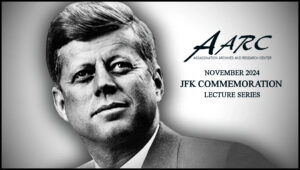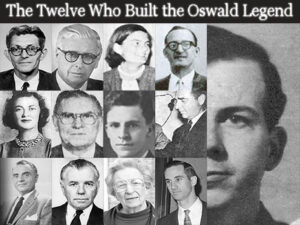 The AARC presents a new series of lectures commemorating and honoring the legacy of President Kennedy, the inspirational meaning of his term of office, and the consequences of his assassination sixty-one years ago.
The AARC presents a new series of lectures commemorating and honoring the legacy of President Kennedy, the inspirational meaning of his term of office, and the consequences of his assassination sixty-one years ago.
In the words of the distinguished British scholar Malcolm Blunt, “Jesus Christ, what we lost when we lost that man.”
By Dan Alcorn
Earlier this year, the Assassination Archives and Research Center filed a petition with the U.S. Supreme Court to bring a freedom of information case before that court. The case involved a freedom of information request for individuals that are related to the assassination of President Kennedy in 1963.
There are three subjects of the Freedom of Information request: the first is David Harold Byrd, who was the owner of the Texas School Book Depository building in 1963. That’s where the shots were said to have been fired at the president. The second subject of the request is Werner von Alvensleben, who had been an intelligence asset – a double agent for the U.S. OSS in World War II, and who was associating with David Harold Byrd, the owner of the Book Depository building around the time of the assassination. The third subject of the request was the Doolittle Report in 1954.
President Eisenhower commissioned Jimmy Doolittle, a World War II hero, to examine the covert activities of the CIA with the goal of making them more effective and efficient. [See The Doolittle Report] Jimmy Doolittle conducted a fairly quick review of CIA activities and then made certain recommendations. This is of interest because Jimmy Doolittle and David Harold Byrd were substantial friends according to General Doolittle and so that is another connection that we have that we are interested in.
We have not been able to get access to the operational files of the CIA; they’ve refused to give us access to any of the operational files about these three subjects of the investigation. This is important to us because we have sourcing from the Dallas Morning News that Werner von Alvensleben was in Dallas in late 1963 as the guest of David Harold Byrd. And this is important as we get into the background of Werner von Alvensleben because at one time, earlier in his career in 1933, he had been an assassin for Heinrich Himmler, the Nazi leader in Hitler’s Germany, and that makes it relevant to exploring what was going on in 1963.
Back to a little background of the owner of the Book Depository building; it is surprising that not all of these facts have been known until this point because we’re 61 years beyond the assassination, yet there are key relevant facts that are still emerging. I saw the name of David Harold Byrd on the historical plaque on the side of the building, the Schoolbook Depository building, when I was in Dallas, maybe 20, 25 years ago, and I noticed David Harold Byrd, BYRD, spelled like the famous political family in Virginia, the Virginia political Byrds, who basically controlled the politics of the state in almost the entire 20th century.
When I saw that name, I thought they couldn’t possibly be connected in any way, but I was wrong. It turns out that they were related, they were distant cousins, but they were related and they developed a relationship through David Harold Byrd, the owner of the Book Depository building, who became a financial supporter of the activities of Admiral Richard Byrd, who was the brother of U .S. Senator Harry F. Byrd.
 Who was David Harold Byrd, the owner of the Book Depository building? We know that he was a founder of the Civil Air Patrol in the entire country, and he served as one of the leaders of the Civil Air Patrol on a national level. He was on the National Executive Committee, which had about 11 people on it. He was the vice chairman for a good period of time and chairman at another time. This is relevant because Lee Harvey Oswald was a cadet in the Civil Air Patrol when he was in New Orleans in High School and that has led some to believe that there might be some meaning in Oswald’s membership in the Civil Air Patrol.
Who was David Harold Byrd, the owner of the Book Depository building? We know that he was a founder of the Civil Air Patrol in the entire country, and he served as one of the leaders of the Civil Air Patrol on a national level. He was on the National Executive Committee, which had about 11 people on it. He was the vice chairman for a good period of time and chairman at another time. This is relevant because Lee Harvey Oswald was a cadet in the Civil Air Patrol when he was in New Orleans in High School and that has led some to believe that there might be some meaning in Oswald’s membership in the Civil Air Patrol.
Why are we interested in David Harold Byrd as the owner of the Book Depository building? It’s because, after the assassination, Byrd ordered the sniper’s window removed from the building and set up in his mansion in Dallas as a display item. And, it was reported that various social events thereafter occurred in front of that window. As seen in photographs of the window in Byrd’s house, there are various depictions of the single bullet theory that are taped to the window panes, and it’s clearly made as a display item that supports the official Warren Commission version of the assassination and the single bullet theory.
As I mentioned, there is also interested in Byrd’s relationship with Jimmy Doolittle. Jimmy Doolittle turns out to have been a high-ranking intelligence advisor to President Eisenhower and a substantial friend of David Harold Byrd.
Among other people, our research has found– were known to David Harold Byrd, was an Ernst Udet. U -D -E -T, and he was the number two in the Luftwaffe to Hermann Göring in Nazi Germany. Byrd describes Udet as a close friend in Byrd’s autobiography, and Udet was in charge of research and development for the Luftwaffe, which is the theme that seems to run through some of these connections: the forward -looking research and development process for aviation and aerospace. Aviation was the basis for the relationship between Byrd and Ernst Udet of the Luftwaffe.
Our interest in Werner von Alvensleben is that he ran a big game hunting concession in Portuguese East Africa called Safarilandia. This was said to be the largest big game hunting operation in Africa. Von Alvensleben had gone to Africa in World War II where he ultimately served as a double agent for the OSS in Portuguese East Africa. After the war he tried to come to the United States, but he was denied permission to migrate to the United States, and he stayed in Portuguese East Africa and created the big game hunting operation. He had an elite clientele, King Juan Carlos of Spain was an example, Stavros Niarchos, the shipping magnate, was a client. David Harold Byrd was reported to be a client at Safarilandia. And the Dallas Morning News reported that Byrd was at Safarilandia on November 22, 1963. And that is a story that places Byrd’s location at the time of the assassination.
There is some corroborating evidence for that in the form of a photograph of an elephant with writing on it saying “shot by Harold Byrd December 7th 1963.” This is part of a photo series that was produced on the hunt that Byrd was said to have attended. And this photo series was created by von Alvensleben’s nephew, Christian von Alvensleben, and he has posted it on the internet under the website as “Mozambique 1963.”
However, this photo series raises some troubling questions. One is that Christian von Alvensleben shows a photograph that he identifies as David Harold Byrd arriving at Safarilandia for the November 22nd Safari hunt. But, the person in the photograph is not David Harold Byrd, it’s just clearly not him. It’s an older gentleman, but not David Harold Byrd. We don’t know who this individual is.
There are no photographs in the Christian von Alvensleben photo series that are identifiable as David Harold Byrd, nor is he in the photograph with the elephant that’s been shot. David Harold Byrd is not in that photograph, though it says the animal was shot by him. So, it has raised a question about whether David Harold Byrd was in fact in Safarilandia in Portuguese East Africa at the time of the assassination, as there seemed to be another individual there identified as Byrd. There’s also someone in the photo series named Tom May who’s identified as a Dallas schoolbook publisher and it’s not known who this individual is as well.
In researching Werner von Alvensleben and his big game hunting operation, I came across the information that von Alvensleben ‘s favorite rifle was the Mannlicher-Schoenauer rifle. Of course, I was familiar with the Mannlicher -Carcano because that’s the rifle said to have been used to kill President Kennedy. I wasn’t aware of the Mannlicher-Schonauer. I did some research and it turns out that the Mannlicher-Schonauer was the finest hunting rifle of that era, it was an Austrian rifle.
It was said on numerous sites devoted to guns and ammunition. that the Mannlicher-Schonauer and the Mannlicher-Carcano rifles used essentially identical ammunition. Very difficult to tell the two cartridges apart. There are sources among the blogs that say the ammunition, some ammunition was manufactured with the purpose of being used interchangeably between the two rifles. Well, this rifle was the favorite rifle of Werner von Alvensleben, the big game hunter. It was also favored by other big game hunters of the time because of its ability to stop large animals; that was what it was particularly effective for. In researching the Mannlicher-Schoenauer rifle I came across testimony to the Warren Commission; it came up before the Warren Commission in the following way: Warren Commissioner John McCloy was at a session in which the FBI ballistics expert, Robert Frazier, testified. John McCloy interrupted the questioning to ask his own question, which was whether the three hulls (cartridges) that were found on the sixth floor of the Book Depository building could have been fired by a Mannlicher-Schonauer rifle rather than a Mannlicher-Carcano rifle. FBI expert Frazier responded that he was not familiar with the Mannlicher-Schonauer rifle, and so he could not express an opinion because he just did not have sufficient knowledge to answer the question. John McCloy responded that he himself owned a Mannlicher-Schoenauer rifle and that he was familiar with it.
The question never was answered in the Warren Commission testimony on ballistics. It was left unanswered and it leaves open the possibility for further investigation whether the shells that are at the National Archives that came from the 6th floor, whether they are indeed Mannlicher-Carcano hulls (cartridges).
In understanding the background of David Harold Byrd and how he came to be the person that he was, I came across the fact that he was a significant U.S. government contractor in the ownership of companies that contracted with the U.S. government. His company, TEMCO, was set up after World War II to continue aviation manufacturing in the Dallas-Fort Worth area. Dallas-Fort Worth had been the site of some of the factories in World War II that manufactured bombers during the Roosevelt administration. When the war ended, the people who ran these plants wanted to continue the work, and they approached David Herold Byrd about obtaining financing to be able to continue building planes for the government. And he did finance and took a large ownership stake in TEMCO, which stood for Texas Engineering Manufacturing Company.
Research showed that TEMCO became a prime contractor for the Air Force in the field of electronic warfare. This began in the early 1950s when with the Korean War there was a big step -up in military contracting and the Air Force picked five contractors to do sole source contracting for the Air Force to outfit the secret electronics onto Air Force planes that could be used then to fly into hostile airspace or near borders of hostile countries. This was the important reconnaissance function of the Air Force. These planes, the jet version that came out later in the 50s, was the RC -135 reconnaissance plane and TEMCO, Byrd’s company, financed and performed the electronics outfitting of the RC -135. The Air Force set up a sole source non-compete contracting arrangement for five companies. TEMCO was one of the five companies that performed this work.
Out of this work from TEMCO developed a company called E-Systems and E-Systems stood for the part of TEMCO that was working the electronics for electronic warfare. TEMCO merged with Ling and Vought in 1960 creating a company, LTV, Ling TEMCO Vought, that became a large defense contractor in the 1960s. Out of Ling TEMCO Vought Electro Systems developed doing this electronics work and then the name was changed to E-Systems in the 1960s. E-Systems is well known as a very large CIA contractor and one of the significant ones of that era.
Research showed that in 1975, because of the Church Committee investigation, the CIA needed to sell its Air America proprietary airline; CIA decide it would be best to unload it because of the controversy, so the CIA asked E-Systems if they would buy Air America from the CIA.
E-Systems decided that they did not want all of Air America, but they would take the Air America ground maintenance. function. And so, they bought Air Asia from the CIA in 1975. There are documents on the CIA website that show this, and this shows how close E-Systems was to the CIA. There are also documents on the CIA’s website that indicate that when Robert Gates was appointed deputy director of the CIA in the late 1980s, he was making goodwill trips around the country to various cities, and there was a proposed itinerary for Dallas when he went to Dallas and the proposed itinerary began with a trip, a visit to E-Systems corporate facility in Dallas and then on to the Dallas Morning News and then to an appearance at the World Affairs Council in Dallas. So, another indication that E-Systems was closely aligned with the CIA and as I say, E-Systems came out of a company financed by David Harold Byrd doing electronic warfare mechanical work.
In addition, the Carswell Air Force base in Fort Worth was the headquarters of the Eighth Air Force, and the Eighth Air Force was the primary bombing organization from the United States that was sent to England during World War II to bomb Germany. It was really the strongest bombing power that the U.S. military had. And the Eighth Air Force was commanded at times in World War II by Jimmy Doolittle. And it was affiliated with the Strategic Air Command under Curtis LeMay. Research found a photograph of a VIP inspection of the Carswell Air Force Base in 1949. And that photograph shows Curtis LeMay, Richard Russell, Senator Richard Russell, who was Chairman of the Armed Services Committee of the Senate and was on the Warren Commission., Ramey, who was the head of the 8th Air Force, Stuart Simington, who was Secretary of the Air Force in 1949, Lyndon Johnson, U.S. Senator from Texas at the time, and Homer Thornberry, who was a member of the U.S. Congress. The caption for this photograph said there were two other VIP’s present who weren’t in the photograph. One was Amon Carter, the famous businessman from Fort Worth, and the other was D. Harold Byrd, Vice Chairman of the Civil Air Patrol. This gathering occurred at the inspection of Carswell Air Force Base in 1949.
So, the conclusion of the research has indicated there are connections from the ownership of the Schoolbook Depository building to some of the most secret elements of the government, classified elements, and that these are significant connections and they may have significance in our research and analysis of the information.
Thank you.
*************************************************************************
 Dan Alcorn: Formerly a law partner of AARC co-founder, the late Bud Fensterwald, has served on the AARC board since 1991, and was a founding director of the Coalition on Political Assassinations (COPA) and served on COPA’s board until the end of the Assassination Records Review Board process in 1998. Dan has represented requesters in precedent setting Freedom of Information Act (FOIA) cases in the trial and appellate courts in Washington, D.C., including cases related to the JFK assassination, the Martin Luther King, Jr. assassination, allegations of misconduct in the FBI crime laboratory, death squad activity in Central America, and intelligence abuses, among other issues.
Dan Alcorn: Formerly a law partner of AARC co-founder, the late Bud Fensterwald, has served on the AARC board since 1991, and was a founding director of the Coalition on Political Assassinations (COPA) and served on COPA’s board until the end of the Assassination Records Review Board process in 1998. Dan has represented requesters in precedent setting Freedom of Information Act (FOIA) cases in the trial and appellate courts in Washington, D.C., including cases related to the JFK assassination, the Martin Luther King, Jr. assassination, allegations of misconduct in the FBI crime laboratory, death squad activity in Central America, and intelligence abuses, among other issues.
Partner 1985-1999, Fensterwald & Alcorn, A Professional Corporation specializing in Litigation, Constitutional Law/Freedom of Information, International Law, Labor & Employment/Security Clearances.
Admitted to the bar, 1980, Virginia. 1984, District of Columbia.
Director: Metropolitan Washington Airports Authority, 1990-1996.
Vice-Chairman, 1994-1996 . Member: District of Columbia Bar, Virginia State Bar.
Founder, Dulles Corridor Rail Association, 1998.
Director, Assassination Archives and Research Center, 1992- 2023.
President, Assassination Archives and Research Center, 2023.
DANIEL ALCORN has been listed as an AV lawyer by Martindale-Hubbell. Association of Criminal Defense Lawyers Executive Director Stuart Statler called Mr. Alcorn, “a lawyer’s lawyer” after his work on the FBI Crime Lab FOIA case.
On the C-SPAN Networks:
Daniel S. Alcorn, as a Board Member for the Assassination Archives and Research Center is featured on three videos in the C-SPAN Video Library; the first appearance was a 1997 House Committee as a Counsel for the National Association of Criminal Defense Lawyers.
Copyright © AARC. All rights reserved.
















